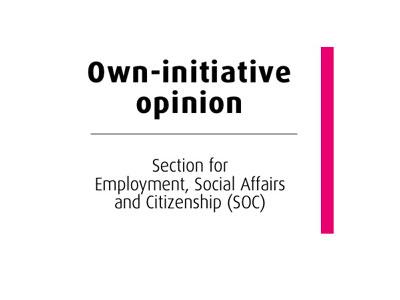European Economic
and Social Committee
For an EU framework for national homeless strategies based on the principle of Housing First
Background:
Over the last 15 years, homelessness has more than doubled in most Member States and in the EU as a whole. Estimates show that at least 895 000 people experience street homelessness or stay in a homeless shelter on any given night in the EU, and several million people experience homelessness each year, including less visible forms such as couch surfing.
The majority of homeless people are male and middle aged, but women, young people, families and children are also affected. In a worrying trend, there is a growing number of migrants and those from minority ethnic backgrounds among the homeless population. There are also certain groups among this population which deserve specific attention, such as LGBTIQ people, people living with disabilities and the ageing homeless.
In June 2021, the Portuguese presidency of the Council of the EU, with the support of the European Commission, launched the European Platform on Combating Homelessness (EPOCH). The Lisbon Declaration, the political basis for EPOCH, was signed by all 27 EU Member States, the Commission, the European Parliament, the EESC, the Committee of the Regions, several European NGOs and a number of other stakeholders. The signatories undertook to cooperate on homelessness at EU level and to work towards ending homelessness by 2030. The signatories agreed that the housing-led approach is the most effective way to tackle and prevent homelessness.
However, despite political efforts, not enough is being done to address homelessness at either European or national level. There is no truly global approach and no comprehensive strategic solutions – and this means that homelessness is continuing and in fact getting worse, driven by the cost-of-living crisis.
The EESC wants homelessness to remain a social policy priority for the EU in the run-up to the European elections and beyond. What is needed is an all-encompassing policy response, with a strategic shift in focus from managing homelessness to actually ending it by 2030.
Key points:
In the opinion, the EESC:
- advocates designing an EU homelessness strategy which fully incorporates EPOCH. National policies combating homelessness could then be factored into the European Semester exercise. To support the strategy, the Council should adopt a recommendation on homelessness. In this regard, the EESC calls on the future Belgian presidency of the Council of the EU to start work on a recommendation;
- is in favour of actively promoting the "Housing First" principle to address chronic homelessness. This principle views housing not just as shelter but as a pivotal tool for reintegration, providing long-term solutions without imposing immediate conditions in terms of accepting support or demonstrating personal development. The EESC also proposes a European training programme to boost the uptake of Housing First;
- urges Member States to live up to their commitment and make substantial progress towards ending homelessness by 2030, emphasising the need for ambitious and achievable milestones. The EESC calls on countries to implement national homelessness policies and integrate the Housing First approach into their strategies based on the Lisbon Declaration.
The text of the draft opinion can be found here.
Additional information
Section: Employment, Social Affairs and Citizenship (SOC)
Opinion number: SOC/768
Opinion type: Own-initiative opinion
Rapporteur: Maria del Carmen Barrera Chamorro
Co-rapporteur: Ákos Topolánszky
Reference: Rule 52(2) of the Rules of Procedure
Date of adoption by section: 21/11/2023
Result of the vote: 83 in favour/1 against/0 abstention
Date of adoption in plenary: 13/12/2023
Result of the vote: 172 in favour/ 2 against/ 5 abstentions
Contacts:
Press officer: Laura Lui
Tel.: 00 32 2 546 9189
email: laurairena.lui@eesc.europa.eu
Administrator: Bartek Bednarowicz
email: Bartek.Bednarowicz@eesc.europa.eu
